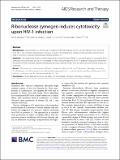Ribonuclease zymogen induces cytotoxicity upon HIV-1 infection
Author(s)
Windsor, Ian W.; Dudley, Dawn M.; O’Connor, David H.; Raines, Ronald T.
Download12981_2021_Article_399.pdf (1.072Mb)
Publisher with Creative Commons License
Publisher with Creative Commons License
Creative Commons Attribution
Terms of use
Metadata
Show full item recordAbstract
Abstract
Background
Targeting RNA is a promising yet underdeveloped modality for the selective killing of cells infected with HIV-1. The secretory ribonucleases (RNases) found in vertebrates have cytotoxic ribonucleolytic activity that is kept in check by a cytosolic ribonuclease inhibitor protein, RI.
Methods
We engineered amino acid substitutions that enable human RNase 1 to evade RI upon its cyclization into a zymogen that is activated by the HIV-1 protease. In effect, the zymogen has an HIV-1 protease cleavage site between the termini of the wild-type enzyme, thereby positioning a cleavable linker over the active site that blocks access to a substrate.
Results
The amino acid substitutions in RNase 1 diminish its affinity for RI by 106-fold and confer high toxicity for T-cell leukemia cells. Pretreating these cells with the zymogen leads to a substantial drop in their viability upon HIV-1 infection, indicating specific toxicity toward infected cells.
Conclusions
These data demonstrate the utility of ribonuclease zymogens as biologic prodrugs.
Date issued
2021-10-26Department
Massachusetts Institute of Technology. Department of Chemistry; Koch Institute for Integrative Cancer Research at MITPublisher
BioMed Central
Citation
AIDS Research and Therapy. 2021 Oct 26;18(1):77
Version: Final published version